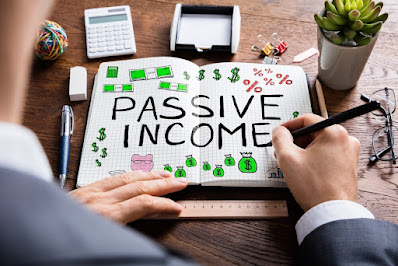If you search for “passive income” on the Internet, you may find a definition or two, but mostly websites that try to sell you the passive income fad of the day. It’s frustrating, I know. I don’t know about you, but before I jump on an opportunity or even before I go on a trip, I like to do some research. That being said, there are a lot of excellent opportunities out there. But before we spend money, let’s look at what passive income is and what it is not.
Webster’s dictionary defines passive income as “a business activity in which the investor has no immediate control over the income.” I don’t think that tells the entire story. Passive income is money that you receive repeatedly without having to do much work (notice I didn’t say “any work”). It’s different from earned income in that you don’t receive money for your time (like you would for a job). But depending on the passive income stream you choose, you can actually have immediate control over your income. But I’ll get to that later.
Why would you want passive income? Well, as Robert Kiyosaki explains in his book Rich Dad Poor Dad, this is the fundamental difference between the rich and the middle class. The rich invest their money in various passive income streams. When their passive income exceeds their expenses, they are financially free. “Financially free” simply means that you don’t need to have a day job to pay for your expenses. And you are “free” to do whatever you want!
What passive income is not
Before I tell you what passive income is, let me first tell you what it is not. Passive income is not the same thing as “residual income.” Residual income is the money you receive regularly after you have worked once. The best example would be television sitcoms. Some actors receive “residual income”. They pay actors for shooting the show. Afterwards, some actors are paid each time the show is repeated. Sellers of services, subscriptions, or renewable products (such as insurance) sell the item only once, and if the customer renews the subscription, they receive a commission on each renewal. Royalties from book and music sales are also residual.
Many say that multi-level marketing or network marketing gives you passive income. Guess what? That’s residual income too.
If you have a small business or are self-employed, even if you make a lot of money, it is NOT passive income. If you receive a salary from your business, we earn it income. However, there is a way to turn that income into passive income, so stay tuned.
You know, I have to say that creating your own website cannot be passive income. Whether you are selling a product (such as an eBook, seminar, or other information) or a service, you still have to market your website. You will need to do this whether you are selling your OWN products or whether you may sell other people’s products. Marketing your website is a job, it’s that simple. But it’s not work. And once your marketing efforts take off, you can make a lot of money with little extra effort. But that’s residual income, not passive income.
What is passive income?
Passive income is many things. The first thing that comes to mind, and also the most popular example, is real estate. If you own an investment property and you get a positive cash flow from a house, commercial property or apartment, that’s passive income. If you rent out rooms in your home, that’s also passive income. You only have to set it up once, and then the income comes in month after month. Interest earned on savings accounts, CDs and money market accounts is passive income - the bank pays you to keep your money in those accounts. If you have a website with banner ads or Google AdSense ads, that also qualifies as passive.
If you invest in a business of any kind but don’t run it, your profits are passive income, which is exactly what Webster was thinking when he wrote this definition.
What about business? Well, that depends on how you set it up. Rich people start businesses and set up a system that the business follows. So if the owner goes on vacation for a month in Fiji, the employees follow the system and the owner continues to collect the profits. Of course, any business takes a lot of work up front, but if you take the time to set up a business in a way that produces repeatable results (just like a franchise), those profits become passive. And, according to the IRS, any wages you receive from your business are considered “earned”, but the profits are considered “passive”. It is essential when starting a business to consult with an accountant and attorney to set up a structure that is most helpful to you financially.
What else can be passive income? Self-storage facilities, parking lots and dry cleaners! These businesses all take some time to get started, but once they are established, you collect money repeatedly.
Residual and passive income
Residual and passive income are like siblings. They are both very similar and most people consider them synonymous. What difference does it make, anyway? They are both great ways to get money in your hands month after month after month without trading your time or freedom. How can you do better than that?
Need to build Passive Income? The CB Passive Income 5.0 is an affiliate marketing system introduced by Patric Chan. This program helps you make money with the help of Clickbank as their affiliate marketer. Written by a successful internet marketer and best-selling author, the CB Passive Income 5.0 helps you start your own online business. It is one of the best-selling products on Clickbank, ranking high over the past few years.
Click https://deliverit.blogspot.com/p/the-cb-passive-income-50.html for more review details.
Reality Check
Beware of those who tell you that there is NO work in passive income. Passive income does not mean no work! If you want to invest in a business, stock, or real estate, you will need to do research (this is called “due diligence”). Research is work! You’ll also need to manage your investments, check their progress and make changes if necessary. That’s work too!
The good news is that research and management are only part-time work. And most of the time, this work can be done from almost anywhere, including a beach in Fiji.
Let’s not forget the “FUN” factor. I’m sure some of you reading this enjoy, even love your job (if you still have one). Some of you have your own business - and congratulations to you! But most of us have jobs because we have to feed our families and pay the bills. By researching passive income streams and investing your time and money, you can get a huge return on your investment. Researching and implementing your passive income plans so you can live your dreams is fun. Receiving money every month, every week or even every day is fun. And trying new strategies and managing your money - when you have money to manage - is FUN.





